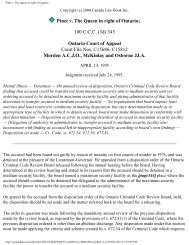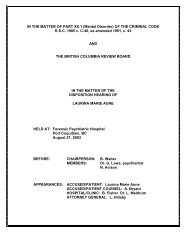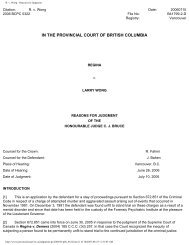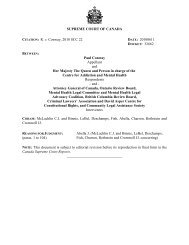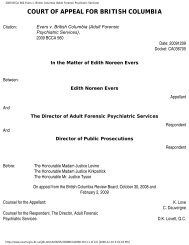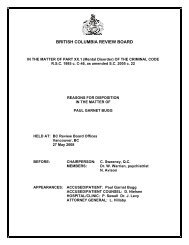R. v. Cuerrier - British Columbia Review Board
R. v. Cuerrier - British Columbia Review Board
R. v. Cuerrier - British Columbia Review Board
You also want an ePaper? Increase the reach of your titles
YUMPU automatically turns print PDFs into web optimized ePapers that Google loves.
R. v. <strong>Cuerrier</strong><br />
factors that have the effect of making a person's consent to the application of force meaningless. Where<br />
those factors are present, a true expression of a complainant's autonomous will cannot be<br />
obtained. Parliament has recognized with s. 265(3), that in order to maximize the protection of physical<br />
integrity and personal autonomy, only consent obtained without negating the voluntary agency of the<br />
person being touched, is legally valid.<br />
13 Given these objectives of the Criminal Code assault scheme, and the important protections<br />
inherent in the individual's power to consent or deny consent, how should "fraud" be interpreted in<br />
relation to consent in s. 265(3)(c)? When interpreting s. 265(3)(c), it is important to keep in mind that it<br />
applies to consent to all forms of assault, not, for example, just sexual assault, or assault where there is<br />
potential or actual serious physical injury. The interpretation of the fraud provision, therefore, should be<br />
based on principles that are consistent across the different assault contexts. In this respect, I must<br />
expressly disagree with the approach taken by my colleague, Cory J. In my view, his interpretation of<br />
the fraud provision is inconsistent with such a principled approach to statutory interpretation.<br />
14 Cory J. states that, apart from the traditional common law approach where the fraud relates to<br />
"the nature and quality of the act", fraud will only vitiate consent in the sexual assault context where an<br />
accused's objectively dishonest act has "the effect of exposing the person consenting to a significant risk<br />
of serious bodily harm" (para. 128 (emphasis added)). Notwithstanding the fact that the accused in this<br />
appeal has been charged with aggravated assault and not sexual assault or aggravated sexual assault, in<br />
my view, my colleague's test has the effect of creating a different interpretation of "fraud" depending on<br />
the sexual nature of the particular offence with which an accused has been charged. In my view, my<br />
colleague's interpretation has the effect of undoing what Parliament accomplished with its 1983<br />
amendment of the Criminal Code: it re-introduces, in the sexual assault context, artificial limitations as<br />
to when fraud will negate consent to physical contact. With respect, I cannot accept the correctness of<br />
such limitations, nor support reverting, once again, to the singular and differential treatment of sexual<br />
assault.<br />
15 As I have explained, the assault scheme is very broad in its objectives to protect people's<br />
physical integrity from unwanted physical contact, and to protect people's personal autonomy to decide<br />
under what conditions they will consent to be touched. Section 265(3) provides further protection to<br />
ensure that when consent is obtained, that consent is a true reflection of a person's autonomous will.<br />
Where fraud is concerned, Cory J. would limit its consent-vitiating effects to the traditional common law<br />
approach, and to those assault contexts where there is a "significant risk of serious bodily harm". But<br />
that which is integral to a principled interpretation of fraud is its causal effect on consent, and the<br />
objectives of the assault scheme. Accordingly, it is appropriate to define fraud in terms of its relationship<br />
to consent, as well as to any and all forms of assault, and not just in terms of the proximity and severity<br />
of the risks associated with the acts for which consent is being given.<br />
16 In my view, considering the wording of s. 265(3)(c), as well as the objectives and context of the<br />
Criminal Code and the assault scheme, fraud is simply about whether the dishonest act in question<br />
induced another to consent to the ensuing physical act, whether or not that act was particularly risky and<br />
dangerous. The focus of the inquiry into whether fraud vitiated consent so as to make certain physical<br />
http://ql.quicklaw.com/qltemp/C2KEwCMAFbZMTYcs/00011scr-00019415%2ehtm (12 of 44)2007-08-21 1:18:15 PM



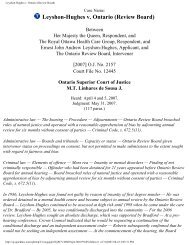
![LaFortune [LaFortunate] (Re) - British Columbia Review Board](https://img.yumpu.com/42779845/1/190x245/lafortune-lafortunate-re-british-columbia-review-board.jpg?quality=85)
